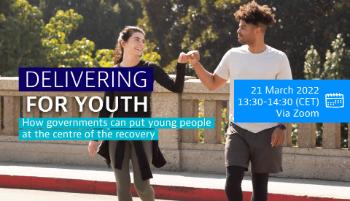
The OECD Public Governance Directorate, a long-standing strategic alliance of AIESEC, recently published a new policy paper on how young people have been experiencing the COVID-19 crisis and government action across OECD countries. The paper “Delivering for youth: How governments can put young people at the centre of the recovery” was presented with the OECD Deputy Secretary-General, Jeffrey Schlagenhauf, and the Permanent Representative of Italy to the OECD, Antonio Bernardini, on March 21st, 2022.
AIESEC was invited to represent its diverse youth network in a panel discussion at the high-level launch event. The panel discussion, moderated by Elsa Pilichowski, Director of OECD Public Governance Directorate, centered on how governments can strengthen public governance approaches to deliver a fair, inclusive, and resilient recovery for young people and include:
- Louise Kim, the Global President of AIESEC
- Mete Coban, Chief Executive, My Life My Say
- Katju Holkeri, Ministry of Finance, Finland
- Marine Marty, Member of Youthwise (the youth advisory board of the OECD)
We invite you to watch the launch event and learn more about the policy paper at https://www.oecd.org/gov/youth-and-intergenerational-justice/delivering-for-youth-2022.htm.
AIESEC and the OECD have a long-standing strategic alliance and shared values for gathering youth insights and hosting inclusive dialogues to empower young people. AIESEC participated in data collection and launch events for recent OECD reports and policy papers, including “Governance for Youth, Trust and Intergenerational Justice: Fit for All Generations?” and “Youth and COVID-19: Response, Recovery, and Resilience”. In turn, the OECD participated in recent AIESEC initiatives, including the YouthSpeak Survey Report Launch and the #FutureProof: International Volunteer Day Webinar.
The new OECD policy paper “Delivering for youth: How governments can put young people at the center of the recovery” presents the views of more than 150 youth organizations from 72 countries, including AIESEC, and a comparative assessment of countries’ response and recovery plans and commitments to lift young people out of the crisis.
Young people’s mental health is the leading concern, followed by its impact on education and employment outcomes, familial relations and friendships, as well as the limitation to individual freedoms. More than half of surveyed youth organizations indicate their members are satisfied with the way in which the government in their country has used scientific evidence to mitigate the pandemic and has communicated about the risks of the pandemic to their citizens.
On the other hand, youth organizations are rather dissatisfied with the way governments have delivered public services for young people during the crisis, notably in the area of sports, culture and leisure, education, housing and employment, and to a lesser extent in health, transportation and mobility, and justice.
Beyond its direct impacts on young people’s wellbeing, youth organizations express concerns about broader societal effects of the crisis, with most worried about the impact on youth rights, inequalities across age cohorts, the spread of disinformation, racial discrimination, and political polarisation. More than half of youth organizations are worried that the crisis may divert government attention away from tackling climate change.
More than one in three OECD-based youth organizations (38%) also estimate their members’ trust in government decreased since the start of the COVID-19 crisis, whereas only 16% report an increase. Similarly, 31% say their members’ satisfaction with democratic processes has decreased, while only 15% report an increase.
In response to the crisis, at least 29 OECD countries include measures to support young people in their national response and recovery plans. At least 24 OECD countries have put in place measures to support young people in vulnerable circumstances. But only 10 countries explain how young people have been consulted when governments determined the priorities for the recovery.
We invite you to read and download the policy paper at oe.cd/gov-for-youth-2022.
AIESEC is one of the world’s largest youth-led organizations and this year, we aim to bridge the gap between youth voices and high-level dialogues such as this event with the OECD.
About AIESEC:
AIESEC is a global platform for young people to develop their leadership potential through international internships and volunteer opportunities. Since AIESEC was founded in 1948, the organization has engaged and developed over 1,000,000 young people globally through international placements and membership opportunities. AIESEC is a youth-run, non-governmental, and not-for-profit organization in consultative status with the United Nations Economic and Social Council (ECOSOC), affiliated with the UN DPI, member of ICMYO, and is recognized by UNESCO.
For more information, please contact: Sumedha Tanwar, Communications Responsible, AIESEC International sumedhatanwar@ai.aiesec.org
19
Leave a Reply